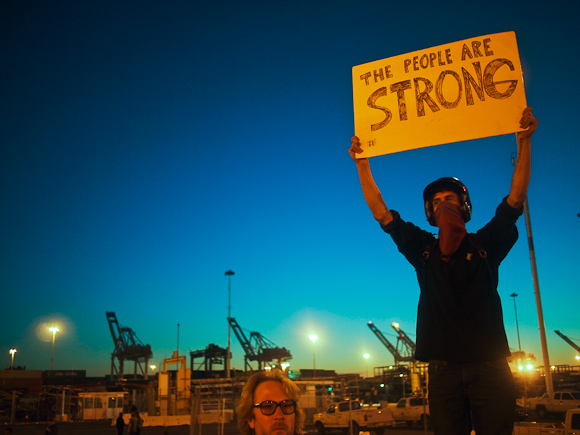United States
United States: #Occupy activists and the Democratic Party -- a debate

For more on the #Occupy movement, click here.
By Dave Duhalde and Dan La Botz
December 4, 2011 -- Against the Current -- Below is a debate between David Duhalde of the Democratic Socialists of America and Dan La Botz of Solidarity that was first published on the website Talking Union.
Where is the beef? An open letter to Dan La Botz on DSA and the Democrats
Dear Dan,
Occupy and the tasks of socialists

"Out of clouds of pepper spray and phalanxes of riot cops a new generation of revolutionaries is being forged, and it would be a shame if the Peter Camejos, Max Elbaums, Angela Davises, Dave Clines and Huey Newtons of this generation end up in separate “competing” socialist groups ... Now is the time to begin seriously discussing the prospect of regroupment, of liquidating outdated boundaries we have inherited, of finding ways to work closely together for our common ends. "
For more on the #Occupy movement, click here.
By Pham Binh
United States: Occupy protesters shut down major West Coast ports; Shutdown tactic debated
Above: December 13, 2011 Democracy Now! report on the port shutdown. Click here for transcript.
For more on the #Occupy movement, click here.
December 13, 2011 -- Socialist Worker -- Ports up and down the US West Coast were shut down or disrupted December 12 in a day of demonstrations organised by the Occupy movement to protest police repression and union-busting.
The call for the December 12 West Coast port shutdown originated in Oakland, where the high point of a general strike call on November 2 -- one week after a savage police attack on the Occupy Oakland encampment -- was a 15,000-strong march to the Port of Oakland and a community picket that stopped work on the evening shift.
African Americans and #Occupy: a convergence of interests
By Malik Miah, San Francisco
December 7, 2011 -- Green Left Weekly/Links International Journal of Socialist Renewal -- What strikes you about the Occupy Wall Street (OWS) movement and its popular slogan “We are the 99%” is how much the central demand of the movement resonates with the Black community. African Americans, with few exceptions, are in the bottom 20% of income and wealth. Double digit unemployment is the norm in “good” economic times. Yet the social composition of most OWS occupations (some 10,000 including college campuses) has had few Black faces including in urban areas with large Black populations.
The reality of high unemployment, few job opportunities, poverty and inadequate health care has most poor people trying to survive. It is why African Americans are not visible in large numbers.
In many cases, however, African Americans are taking to the streets. They are using civil action to protest police brutality and the shutdown of community schools, hospitals and obvious acts of discrimination.
These protests, while widely known in the Black community and Black-oriented media, rarely get prominence in the mainstream newspapers and networks.
Barry Sheppard: What Occupy Wall Street reveals

Occupy has led to an outburst of creativity ...One example is the many photos circulated on the internet showing the cop who pepper sprayed non-violent students at a California campus super-imposed on works of art and other pictures, pepper spraying the people picnicking in a Surrat painting, pepper spraying the members of the Constitutional Convention and so forth.
For more on the #Occupy movement, click here.
By Barry Sheppard, San Francisco
December 7, 2011 – Submitted to Links International Journal of Socialist Renewal by the author. It first appeared in Direct Action -- No one predicted the phenomenon that has become known as Occupy Wall Street (OWS), nor could it have been predicted.
United States: Occupy the Democratic Party? No way!

During the 1960s, Michael Harrington, leader of the gro
Photo essay: 11-11-11 -- Veterans for Peace Arlington West Memorial: 8 years and counting

Photos and text by James Rodríguez, Santa Monica, Los Angeles County, California
November 11, 2011 -- Mimundo.org, posted at Links International Journal of Socialist Renewal with James Rodríguez's permission -- The armistice that ended World War I was signed on November 11, 1918. Since then, many allied nations have adopted the date to commemorate members of the armed forces who have served in a war. In the United States, this day is observed as Veterans Day.
This year’s holiday marks the eight anniversary of a unique commemoration carried out by the Los Angeles chapter of Veterans for Peace (VFP) on the sands of world-renowned Santa Monica Beach. Every Sunday since Veterans Day 2003, numerous VFP members and volunteers have erected a temporary and symbolic cemetery aptly named Arlington West Memorial. White crosses represent one fallen Iraq or Afghanistan war veteran, while red crosses represent 10 US servicepeople killed in action in these two wars.
Martin Hart-Landsberg: Yes, Virginia, there is a 1%

For more on the Occupy movement, click HERE.
By Martin Hart-Landsberg
October 24-November 7, 2011 -- Reports from the Economic Front, posted at Links International Journal of Socialist Renewal with permission -- The Occupy Wall Street movement has succeed in forcing the media to acknowledge the extent and seriousness of income inequality. In many ways wealth inequality is a bigger problem, since it is wealth that largely underpins income and power differences.
According to an Economic Policy Institute posting,
the richest 5 percent of households obtained roughly 82 percent of all the nation’s gains in wealth between 1983 and 2009. The bottom 60 per cent of households actually had less wealth in 2009 than in 1983, meaning they did not participate at all in the growth of wealth over this period.
It is worth dividing the top 5% into what has now become two familiar groups, the top 1% and the next 4%.

